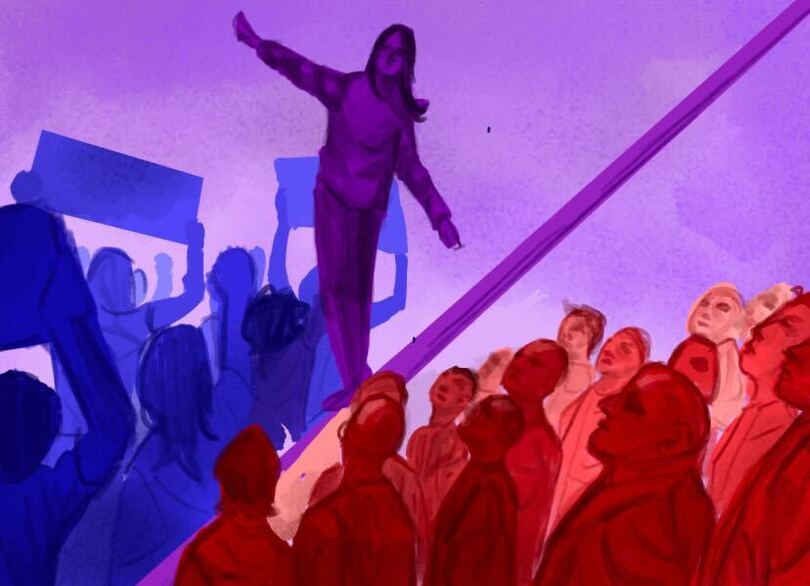Opinion: Indifference to politics won’t save you from personal consequences

Political indifference is a dangerous mindset rooted in privilege, our columnist writes. He expects most Americans would aid a neighbor in distress, but argue this sense of responsibility is absent in the recent U.S. political climate. Khloe Scalise | Contributing Illustrator
Get the latest Syracuse news delivered right to your inbox.
Subscribe to our newsletter here.
Most people grow up with a certain moral compass that rings in their ears when they have to make a decision. If you were in a grocery store and a child lost their parent or a neighbor fell outside of their house, you’d do what you could to alleviate their problem. A friend simply needing a favor activates your natural instinct to help others.
This is because you can see the consequences of inaction directly in front of you. The child will be lost without their parent, and your neighbor will continue to be in pain with no help in sight. You’re the person who can make a difference in your community, no matter how small, and you get the satisfaction of visible change.
But in situations where that clear result won’t manifest before you, morality and sense of responsibility disappear. This is especially pertinent in politics.
When people have to decide between candidates during an election or keep up with rapid current events, they face a disconnect. They don’t feel as if they have a purpose in that conflict. Object permanence and sense of responsibility have become a lost cause, which is an incredibly dangerous trend.
I constantly hear people say things like, “I don’t keep up with politics,” or “Both sides are bad.”
You’ve likely heard these phrases from a friend or family member. Maybe you’ve even said them yourself. Typically, this is a result of feeling immune to the effects of political decisions and events.
In the past year, the country saw some major elections, with the biggest being the presidential election. Democratic nominee and former Vice President Kamala Harris competed with President Donald Trump. While the number of voters in this divisive election was large, there was a decrease in voter turnout compared to the 2020 presidential election.
The Tufts University Center for Information & Research on Civic Learning and Engagement’s estimate of youth voter turnout shows that 2024 had a voter turnout of 47%, falling short of the 2020 election’s record of 50% of all eligible young voters.
From my roles in state and campus politics, I’ve seen the inspiring lengths people go to make their voices heard. Students who canvass every weekend for what they believe in, rally their friends and families to fight for their vision for the future and engage in peaceful protests across the state. Young political engagement can be a beautiful sight of hope, but it doesn’t negate the growing emotional disconnect I’ve seen firsthand.
I had the luck of being born into the most stereotypical definition of a caring home; my family is one of medics, artists, immigrants, academics and changemakers. That environment taught me one thing that I hope everyone learned in their own way: If I am able to help people, and I deliberately don’t, then I contribute to their hurt.
Of course, there are hundreds of hypotheticals and “what-ifs” that overcomplicate situations into complex logic problems, but that only serves to separate consequence from individual responsibility.
Political indifference is a set choice. The ideology that politics don’t affect you or others is harmful, arrogant and privileged.

Zoey Grimes | Design Editor
As young people and students, we’ve grown up in a society where information is more accessible than ever before. Not knowing the world around you is intentionally choosing naivety and borderline ignorance to the lives of others.
I understand how upsetting the news can be and how tedious it is to keep up with everything going on. It’s difficult to live your life while feeling responsible for things that don’t personally affect you. However, failing to give attention to these issues, regardless of their tangible relevance to your own life, hurts others and yourself.
While ICE raids, losing Medicaid or having food stamps cut may feel far away from Syracuse University for some, that is not the reality for many in this community.
In the past few months, the Big Beautiful Bill closed down hundreds of hospitals across the country in rural areas, creating fatal distances between the injured and their last line of aid. That neighbor who fell now can’t get the care they need in time.
The Supreme Court recently approved a measure to allow ICE agents to stop civilians on the basis of their race. That lost child in the grocery store is only alone because their parent was taken from them for being a color other than white.
When factors like these complicate the situation, many feel the urge to step back. But your ability to help extends beyond physical proximity and convenience. You can’t just deem real effects irrelevant because you don’t feel them.
I agree that both political parties have issues, but the argument that both sides are bad is a complex way to rationalize your indifference to others’ lives. It’s merely a justification not to put effort toward awareness or change.
And your indifference will eventually affect you, too. By failing to keep up with the world around you and using your right to vote, those who thrive on misinformation and disinterest gain more power. Media censorship, military occupation and political retribution are all the result of mass voter indifference and will affect every American in due time.
Especially as a student, there’s the entire landscape of academia under direct attack. With the federal government threatening to hold funding from universities that don’t push their preferred ideologies, you’ll continue to see your rights as a student dwindle.
While it’s difficult to keep up with today’s political climate, it’s still a choice you get to make. Getting involved doesn’t have to be as daunting as it feels. It can be something small, like engaging in a peaceful protest, attending a political organization’s meeting or simply reading the newspaper once a day.
Politics doesn’t have to be an elitist game with boundaries of understanding. In this country, we have an incredible system that puts the power of choice in your hands. We may not always feel that power, but it will always be there.
Tyler Toledo is a graduate student studying Public Administration. He can be reached at tatoledo@syr.edu.




